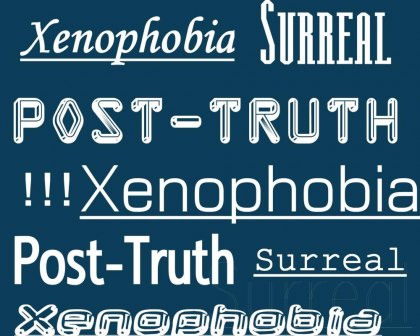
Here are the choices of three major online dictionaries:
- Post-Truth, an adjective, is the word of the year from Oxford Dictionaries. It is defined as, “Relating to or denoting circumstances in which objective facts are less influential in shaping public opinion than appeals to emotion and personal belief.”
“The Oxford Dictionaries word of the year is a word or expression chosen to reflect the passing year in language,” a news release says. “Every year, the Oxford Dictionaries team reviews candidates for word of the year and then debates their merits, choosing one that captures the ethos, mood, or preoccupations of that particular year. Language research conducted by Oxford Dictionaries editors reveals that use of the word post-truth has increased by approximately 2,000 percent over its usage in 2015. ”
- Surreal, an adjective, is the Merriam-Webster word of the year. It is defined as “marked by the intense irrational reality of a dream."
Merriam-Webster saw spikes of interest in the word during coverage of various terrorist attacks, according to a video posted on its website. But the largest spike followed the U.S. presidential election in November. Another word that spiked this year: fascism.
- Xenophobia, a noun, is the word of the year from Dictionary.com. It is defined as “fear or hatred of foreigners, people from different cultures, or strangers.” A news release from the website adds that it also refers to “fear or dislike of customs, dress and cultures of people with backgrounds different from our own.”
The website explains that editors look for a word that “embodies a major theme resonating deeply in the cultural consciousness.” The word xenophobia showed up in trending data. It is “actually relatively new,” according to the website, “and only entered English in the late 1800s. It finds its roots in two Greek words, xénos meaning “stranger, guest,” and phóbos meaning “fear, panic.”
Related:
Vape, selfie and the words that define us
Follow StudyHall.Rocks on Twitter.
If you would like to comment, give us a shout, or like us on Facebook and tell us what you think.